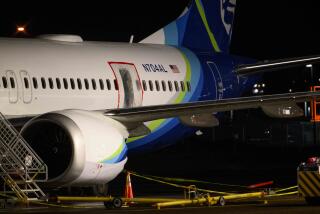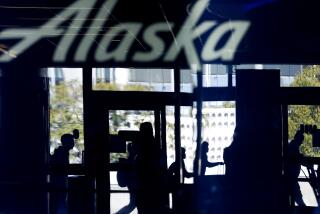Judge Orders Pilots at American to End Sickout
- Share via
American Airlines’ pilots were ordered by a federal judge on Wednesday to end an escalating sickout that forced cancellation of 2,500 flights, disrupted plans for tens of thousands of passengers and threatened to wreak further havoc on the U.S. travel system this busy holiday weekend.
But it was not immediately clear how many of the pilots would drop their job action, even though their union, the Allied Pilots Assn., said it would follow the judge’s order and urge the carrier’s 9,200 pilots to fly if they are “physically capable.”
Even if most of the pilots do return to work, it will take several days for American’s operations to return to normal, said Tim Smith, a spokesman for the carrier.
That could still mean widespread disruptions this Presidents Day holiday weekend because American is the nation’s second-largest carrier behind United Airlines.
“It’s our belief and hope that the majority [of pilots] will obey the judge,” Smith said. But APA President Rich LaVoy said he could not predict how many pilots would return, or how soon.
U.S. District Judge Joe Kendall in Dallas ordered the two sides to keep negotiating, but there was confusion about when the talks might resume. American said the pilots union “called off further talks” scheduled for Wednesday, but the APA said it was “willing to resume bargaining” after it reviewed the judge’s ruling.
Meantime, American began taking steps to heal its damaged reputation among travelers, announcing that it is offering full refunds on all tickets--even nonrefundable ones--for travel through Monday. Customers also can reschedule flights at no charge.
That was little consolation to many of the thousands of people delayed in U.S. airports Wednesday. Ironically, one of them was Tom Parsons, editor of the airline consumer-watchdog publication Best Fares, who was stranded for five hours at Miami International Airport.
Miami was one of the airports hit hardest by the pilots’ job action, and lines of 300 to 500 travelers were common, Parsons said from a pay phone not far from stranded teenagers sleeping on the floor.
“People are disappointed right now, but the good news is it’s not Christmas or New Year’s,” Parsons said, adding that tempers generally remained in check.
American’s far-flung operations have been rapidly deteriorating since last weekend when its pilots--locked in a dispute over American’s recent purchase of regional carrier Reno Air--began calling in sick and refusing to work overtime.
Their numbers grew daily this week, and, by Wednesday evening, about 2,000 pilots had called in sick and were off the job. That forced American, which normally operates about 2,200 flights a day carrying more than 200,000 passengers, to cancel about 1,000 flights Wednesday.
But Judge Kendall issued a temporary restraining order requiring the pilots to end their action. He made the ruling at the request of Fort Worth-based American, which is the main subsidiary of AMR Corp.
“The job action that’s being taken is inappropriate and has to stop,” Kendall ruled.
In seeking the ruling, American’s chief executive, Donald Carty, said the carrier faced “irreparable harm” without the court’s help. American has already lost between $20 million and $30 million because of the pilots’ sickout, analysts estimated.
Other carriers, notably United and Delta, have been able to accommodate most of American’s stranded passengers so far. But the task would have grown much harder this holiday weekend when airplanes nationwide have fewer empty seats.
“What would it have been this weekend? More than half their flights?” said Tom Carroll, an analyst at Duff & Phelps Credit Rating Co. in Chicago. “The disruption would have been fairly significant.”
Sandra deDubovay, a travel agent with Seaside Travel in Long Beach, said the agency has received about 10 calls a day from anxious customers, even though their trips are days or even weeks away. “All of our clients on American are very concerned their flights are going to be canceled,” she said.
At Old Newport Travel in Newport Beach, some customers even paid $75 penalties to change previously booked American flights. “They don’t want to take any chances,” said Old Newport agent Norma Mulligan.
Besides Miami, the hardest-hit markets were American’s other hub airports at Dallas/Fort Worth and Chicago. The delays, long lines and frustrated travelers also were found at Los Angeles International Airport, where American handles about 9% of the passenger traffic.
Raymond Neidl, an analyst at investment firm Furman Selz Inc. in New York, said American probably has not alienated customers for the long term--if the pilots return to work.
“The key question is how quickly will this business come back to American, and my guess is pretty quickly,” he said.
It was Presidents Day weekend two years ago when American’s pilots briefly went on strike after contract talks broke down. The pilots were quickly ordered back to work by President Clinton.
American and the APA then reached agreement on a new five-year contract. But now the union maintains that American is violating that pact with its handling of the $124-million purchase of Reno Air and the integration of Reno’s 300 pilots into the American system.
With their contract in place, American’s pilots are barred by federal law from going on strike over the issue. But the APA said the pilots were legally entitled to call in sick if they were either mentally or physically unable to fly safely, especially in light of the potential “stress” caused by the dispute.
The dispute centers mainly on how fast American will bring the lower-paid Reno pilots up to American’s pay scales. The APA wants it done right away, but American wants to do it over 12 to 18 months. The APA also wants an immediate transition because it would more quickly enable American pilots to be promoted to new jobs created by the Reno acquisition.
The union has also said it wants the dispute settled now in case American acquires an even bigger airline one day and such labor issues take on even greater importance.
As American’s flight delays grew Wednesday, the chairman of the House Transportation Committee proposed that airline passengers delayed for more than two hours be paid for their wasted time.
The bill by Rep. Bud Shuster (R-Pa.) would require airlines to pay passengers double the cost of their tickets for a delay of more than two hours, triple after three hours and so on.
Dave Fuscus, a spokesman for the Air Transport Assn., the airline industry’s trade group in Washington, declined to comment until his group could review the proposal.
*
Times correspondent Stephen Gregory and wire services contributed to this report.
More to Read
Sign up for The Wild
We’ll help you find the best places to hike, bike and run, as well as the perfect silent spots for meditation and yoga.
You may occasionally receive promotional content from the Los Angeles Times.







